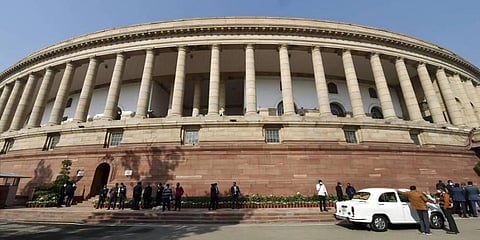

NEW DELHI: The Opposition on Friday strongly opposed the introduction of the Central Vigilance Commission (Amendment) Bill and the Delhi Police (Special) Provisions Bill, arguing that extending the tenures of the chiefs of the agencies is done with the intention to reward the pliable officials.
Union Minister of State Jitendra Singh introduced the two Bills in Lok Sabha. He said the tenures of the chiefs of the agencies were extended under previous governments in an ad-hoc manner, while these Bills propose to fix the tenures to be not less than five years.
The chiefs of Central Bureau of Investigation (CBI) and Enforcement Directorate (RD) currently enjoy fixed two-year terms.
Opposition parties claimed that Central agencies in recent years were allegedly taking political commands to harass leaders of rival parties in various states. They also stated that the Bills are in contrast to the observations of the Supreme Court about the agencies.
Claiming that the motive of the government to amend the two Bills is mala fide, Congress leader Shashi Tharoor argued that the Supreme Court has in the past observed that extension of tenures of the agency chiefs should be rare.
Countering Opposition claims, the minister said he has a list of officials who got extension when others were in power at the Centre. He added that the “caged parrot” term for CBI was coined in times of previous governments. The ‘parrot has been set free’ since the NDA came to power, he added.
Opposing the introduction of the two bills, Congress member Shashi Tharoor said the move to extend the tenures of the directors of central investigative agencies were in "flagrant disregard" of the Supreme Court observations.
Tharoor said the apex Court had observed that extension of tenure granted to officers who have attained the age of superannuation should be done only in rare and exceptional cases and the government move was "malafide".
Trinamool member Saugata Roy opposed the move contending that both the ED and CBI were two arms of the government used to harass opposition leaders.
Congress members K Suresh, Adhir Ranjan Chowdhury and RSP member N K Premachandran also opposed the introduction of the bill.
The members said piecemeal extensions would lead to officers' loyalty to the government.
Seeking to allay the apprehensions of the opposition members, Jitendra Singh said the earlier laws only fixed minimum limit on the tenures of Directors of CBI and ED.
"The earlier laws never put any limit on the tenures, we are limiting it to five years," Singh said.
The minister said the Ordinances were necessitated as Parliament remained disrupted.
"Should the government stop working if the House doesn't work," Singh asked.
The Directors of CBI and ED enjoy a fixed tenure of two years from the date of their appointment in the wake of the directives of the Supreme Court in the famous Vineet Narain case.
The ED Director is appointed by the central government on the recommendation of a committee chaired by the Central Vigilance Commissioner and members comprising of Vigilance Commissioners, Home Secretary, Secretary DOPT and Revenue Secretary.
The Director CBI is selected on the basis of the recommendation of a committee consisting of the Prime Minister, the Chief of Justice of India and the Leader of Opposition.
The fixed term of two years was aimed at ensuring the chiefs of CBI and ED work free from government interference without worrying about any adverse action for the probes carried out by them.
(With PTI Inputs)